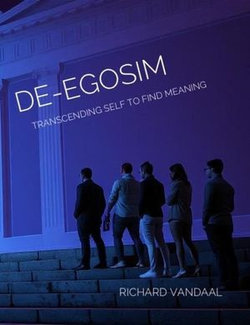DE-EGOISM
De-Egoism offers a practical philosophy for transcending the limitations of ego-driven existence while maintaining healthy functionality in daily life. Unlike complete self-denial, it recognizes the ego as a necessary but ultimately constraining psychological structure that limits our capacity for connection, meaning, and contentment.
Core Principles:
De-Egoism rests on five foundational tenets:
- Ego Recognition - Developing awareness of ego patterns in thoughts, emotions, and behaviors
- Communal Integration - Experiencing self as part of larger systems rather than separate from them
- ]Value Recalibration - Shifting priorities from personal achievement to collective wellbeing
- Presence Before Identity - Engaging directly with reality rather than through ego-constructed narratives
- Balanced Contribution - Finding fulfillment through giving rather than accumulating
Practical Application:
The De-Egoism workbook (offered separately from the book) translates these principles into 26 structured practices across three categories:
• **Foundation Practices** develop core capacities like mindful awareness, perspective-taking, value clarification, and contribution orientation
• **Daily Life Applications** implement these principles in home environments, relationships, work, finances, and civic engagement
• **Advanced Practices** address resistance, facilitate ongoing evolution, and extend principles to collective systems
Each practice includes clear purpose statements, step-by-step instructions, reflection questions, and progress tracking tools.
Intended Outcomes:
Through consistent engagement with these practices, practitioners can expect:
- Reduced suffering from comparison, approval-seeking, and defensive positioning
- Enhanced capacity for authentic connection beyond ego protection
- Greater alignment between values and actions
- More flexible, responsive engagement with challenges
- Increased contribution to collective wellbeing
- Sustainable fulfillment beyond ego gratification
De-Egoism doesn't promise spiritual perfection but offers a practical pathway toward greater freedom from limiting ego patterns. The workbook provides a structured approach for integrating these principles progressively, creating a sustainable journey of development rather than an overwhelming transformation.
The practice meets practitioners where they are, offering entry points for beginners while providing depth for advanced exploration, ultimately supporting a more expansive, connected, and meaningful engagement with life.



Share This eBook: